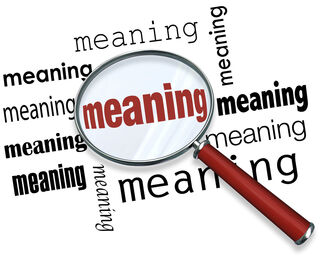Optimism
Realize Your Will to Fulfill Meaning
From mindfulness to meaningfulness.
Posted June 9, 2022 Reviewed by Vanessa Lancaster
Key points
- Life can become an endless and joyless undertaking in our quest for happiness and pleasure.
- Life doesn’t happen to us; we happen to life, and we make it meaningful.
- Often those who have experienced deep suffering rise up and teach us not to be bitter and stuck in our suffering.

Logotherapy, a meaning-centric, humanistic approach to psychotherapy founded by the world-renowned psychiatrist and Holocaust survivor Viktor E. Frankl, “considers man as a being whose main concern consists of fulfilling a meaning and in actualizing values, rather than in the mere gratification and satisfaction of drives and instincts.”1
Instead of simply completing tasks to receive rewards, such as money, influence, status, or prestige, we can realize our will to deeper meaning by making a conscious, authentic commitment to meaningful values and goals.2
When people feel empty inside, they typically turn outward. They look for comfort in pleasure and material things. They look for reassurance in power and try to control others and the things around them. They think: If only I could find pleasure or control things, I would find meaning in my life. They are, unfortunately, mistaken.
The will to meaning comes from within. Only we can find it, control it, and fulfill it for ourselves. This meaning can sustain us throughout our lives, no matter how little or how much power and pleasure come our way. Most important, meaning sustains us through any pain and suffering we must endure.
In his book, Full Catastrophe Living, mindfulness expert Jon Kabat-Zinn writes about staying connected to our original wholeness no matter what challenges to our health, well-being, and welfare we face. The book explores the lives of those for whom life-threatening illness became a transforming experience.
These individuals connected to others in a way that anchored them in love, acceptance, and forgiveness, but they also connected to themselves. Some survived and triumphed over illness, while others didn’t. Despite their various challenges, each of these individuals deepened their experience in ways that honored meaning in their life as well as in their death.
You do not have to suffer to learn. But, if you don’t learn from suffering, over which you have no control, then your life becomes truly meaningless…. The way in which a man accepts his fate—those things beyond his control—can add a deeper meaning to his life. He controls how he responds.—Viktor E. Frankl3
When we take the time to cultivate our relationship with our original self, all of our experience becomes grounded in meaning. This was true for Frankl when he observed the behavior of those alongside him imprisoned in the Nazi concentration camps, it was true for those people interviewed in Kabat-Zinn’s book, and it is true for anyone who has survived tragedy and allowed their grief to break open their heart in tenderness.
When tenderness prevails, we love and forgive ourselves and others. When the opposite happens, when bitterness seals the heart shut, we are isolated from ourselves, from others, and ultimately from meaning itself.
Against the backdrop of everything happening in the world today, the need to commit to meaningful values and goals, that is, to realize our will to meaning, has become paramount. Public health challenges, like the coronavirus (COVID-19) pandemic and the ensuing “collateral damage” that came with it, economic pressures such as unbridled inflation and supply chain bottlenecks, geopolitical conflicts like the grave situation in Ukraine, and various environmental crises related to climate emergencies, all have played their part to effectively inflict pain and suffering, much of which is unavoidable, on everyday life, work, and society.
Frankl wisely advised us that we must say yes to life despite everything.4 Put differently, he defined what he referred to as “tragic optimism” as the human capacity to remain optimistic in the face of pain, guilt, and death.5 In this regard, tragic optimism has recently been described as the opposite of “toxic positivity,” which ultimately is a denial of reality that can, if left unchecked, be detrimental to our mental health.6
Tragic optimism, on the other hand, is viewed as the search for meaning during the inevitable tragedies of human existence. Rather than focusing exclusively on staying “positive,” tragic optimism recognizes life’s darkness and its most formidable challenges. As difficult as it may sound, it also accepts them as “opportunities” for growth, especially what is now called post-traumatic growth.7
Tragic optimism is not only the antidote to toxic positivity during times of extreme hardship and suffering. It also helps to actualize our will for meaning. In turn, by realizing our will to meaning, a correlate of the propensity to experience post-traumatic growth, we are better able to resist the temptation of remaining prisoners of our thoughts and, as a result, build our capacity for resilience when answering life’s call.
References
1. Viktor E. Frankl (1992). Man’s Search for Meaning: An Introduction to Logotherapy, 4th edition. Boston: Beacon Press, p. 108.
2. Alex Pattakos and Elaine Dundon (2017). Prisoners of Our Thoughts: Viktor Frankl’s Principles for Discovering Meaning in Life and Work, 3rd edition. Oakland: Berrett-Koehler Publishers, Chapter 4.
3. Viktor E. Frankl (1992). Man’s Search for Meaning: An Introduction to Logotherapy, 4th edition. Boston: Beacon Press, p. 117.
4. Viktor E. Frankl (2019). Yes to Life In Spite of Everything. Boston, Beacon Press.
5. See Viktor E. Frankl (1992). Man’s Search for Meaning: An Introduction to Logotherapy, 4th edition. Boston: Beacon Press, p. 137-154.
6. Scott Barry Kaufman (2021). “The Opposite of Toxic Positivity,” The Atlantic, August 18, 2021, https://www.theatlantic.com/family/archive/2021/08/tragic-optimism-oppo…
7. Scott Barry Kaufman (2020). “Post-Traumatic Growth: Finding Meaning and Creativity in Adversity,” Scientific American, April 20, 2020, https://blogs.scientificamerican.com/beautiful-minds/post-traumatic-gro…




